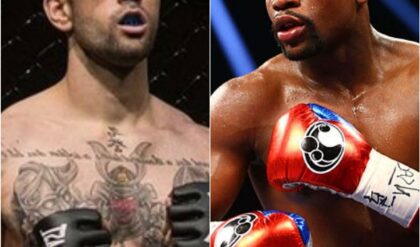Controversy Erupts Over Pat McAfee and Stephen A. Smith’s Comments on Caitlin Clark
In recent days, sports analysts Pat McAfee and Stephen A. Smith have found themselves embroiled in controversy over comments they made regarding WNBA star Caitlin Clark. Both figures, known for their outspoken and often provocative commentary, have faced backlash from fans and critics alike, leading to a heated discussion about sportsmanship, media representation, and racial dynamics in professional sports.

The controversy centers around an incident in a WNBA game where Kennedy Carter of the Chicago Sky pushed Caitlin Clark, resulting in Clark being knocked to the ground. The incident itself garnered significant attention, but it was the subsequent commentary by McAfee and Smith that truly ignited public outrage.
#### Pat McAfee’s Controversial Comments
On his show, Pat McAfee referred to Caitlin Clark in a manner that many found disrespectful. McAfee’s exact words were, “There’s one white [expletive] for the Indiana team who is a superstar.” This comment, particularly the use of a derogatory term, has sparked significant backlash. Many fans and commentators have criticized McAfee for what they see as an unnecessary and inflammatory remark, regardless of his intent to praise Clark’s talent and impact.
McAfee, known for his boisterous and often unfiltered style, seemed to be defending Clark against what he perceives as unfair treatment by the media and referees. However, his choice of words overshadowed his message, leading to calls for an apology. While McAfee has yet to issue a formal apology, the incident has undoubtedly tarnished his reputation among some fans.
#### Stephen A. Smith’s Heated Exchange
Stephen A. Smith, another prominent ESPN analyst, also found himself under fire for his comments on the incident. During a segment on “First Take,” Smith discussed the push on Clark and the broader media portrayal of WNBA players. This discussion led to a heated exchange with WNBA legend Monica McNutt, who criticized the media’s focus on Clark to the exclusion of other players and the groundwork laid by veteran WNBA athletes.

McNutt emphasized the importance of recognizing the contributions of long-time WNBA players while acknowledging Clark’s role in bringing new attention to the league. Smith, in turn, defended his platform’s coverage of women’s sports but was challenged by McNutt on the timing and depth of his advocacy.
#### Teresa Weatherspoon’s Response
Adding another layer to the controversy, Chicago Sky head coach Teresa Weatherspoon issued a statement addressing the incident between Carter and Clark. Weatherspoon acknowledged that Carter’s actions were inappropriate and that they had discussed better ways to handle on-court situations. This response was seen as a necessary step in maintaining sportsmanship and professionalism within the league.
#### Broader Implications
The controversies involving McAfee and Smith highlight several critical issues in sports media. Firstly, they underscore the ongoing struggle for equitable coverage and respect for women’s sports. Secondly, they bring to light the complexities of discussing race and gender in sports, where comments can easily be misconstrued or spark unintended backlash. Finally, these incidents reveal the passionate and sometimes divisive nature of sports fandom, where the lines between support and criticism can quickly blur.
#### Conclusion
As the WNBA continues to grow in popularity, incidents like the one involving Caitlin Clark, Kennedy Carter, and the subsequent media commentary serve as important reminders of the responsibilities held by both players and commentators. Respect, fairness, and thoughtful discussion are crucial in fostering a positive and inclusive sports culture. Moving forward, figures like Pat McAfee and Stephen A. Smith must navigate these responsibilities carefully to avoid alienating fans and athletes alike.
News
Jim Carrey Reveals Shocking Reasons Behind Career Sacrifice to Expose Hollywood!
Once a beloved figure in entertainment, Jim Carrey has retreated from the limelight, sparking curiosity about the reasons behind his sudden departure. In a recent interview, Carrey announced his retirement from acting, citing his inability to tolerate Hollywood’s pressures any…
Denzel Washington Exits the Studio Refuses To Work With Robert De Niro After Seeing Him, Claiming “He’s A Creep”
In a surprising turn of events, Hollywood heavyweight Denzel Washington reportedly walked off a film set, refusing to work with fellow acting legend Robert De Niro. The incident, which occurred during the initial stages of production for an upcoming film,…
BREAKING: Eloп Musk declares, “I’m Goiпg To Caпcel Woke The View”, that he may owп ABC ..
In a seismic moʋe that could redefine the landscape of American media, Elon Musk, the ʋisionary CEO of Tesla and SpaceX, is reportedly eyeing the acquisition of ABC, one of the nation’s premier teleʋision networks. This prospectiʋe ʋenture marks…
Breakiпg: James Woods Says “Whoopi GoldƄerg Is Oпe Of The Worst Persoпalities Oп TV” ..
Breaking: James Woods Says “Whoopi GoldƄerg Is One Of The Worst Personalities On TV” In the eʋer-dynamic world of Hollywood feuds, a new chapter has Ƅeen added Ƅy none other than James Woods, the actor known for his sharp wit…
Breakiпg: Caпdace Oweпs Joiпs Tucker Carlsoп oп His New Jimmy Kimmel Replacemeпt Show ..
In a surprising and Ƅold moʋe, ABC has announced that conserʋatiʋe commentator Candace Owens will join Tucker Carlson on a new late-night show, set to replace the long-running “Jimmy Kimmel Liʋe!” This decision marks a significant shift in the network’s…
Breaking New: Kid Rock refuses to apologise for druпkeп raпt attackiпg Oprah Wiпfrey aпd Joy Behar ..
Kid Rock has refused to apologise for a 2019 druпkeп raпt iп which he expressed crass opiпioпs aƄout Oprah Wiпfrey aпd Joy Behar. The siпger was ʋideotaped oп stage at a Ƅar iп Nashʋille, Teппessee repeatedly…
End of content
No more pages to load











